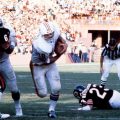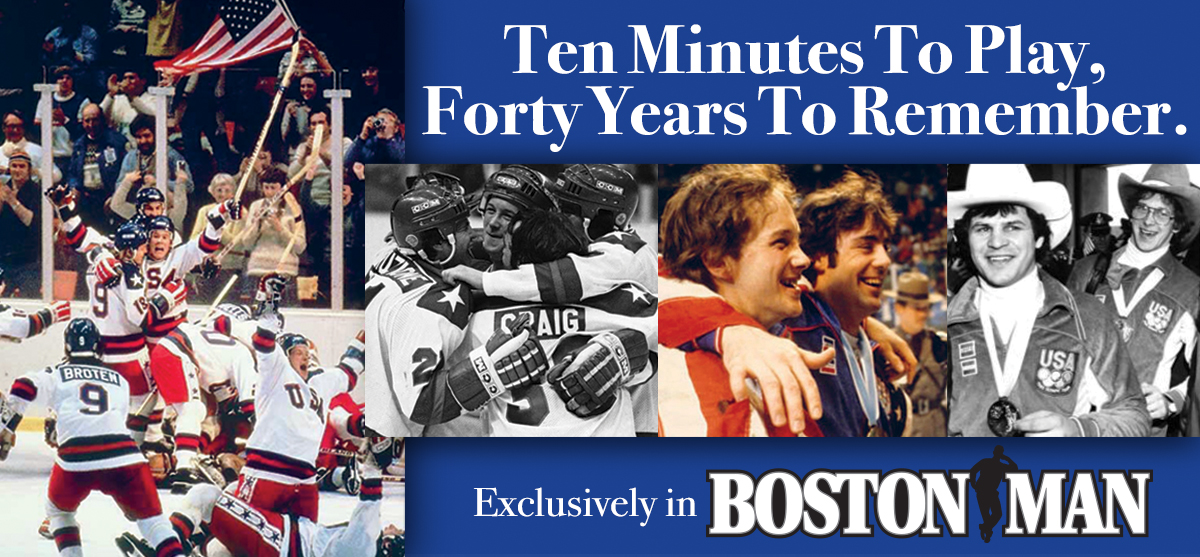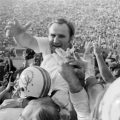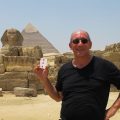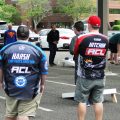The Miami Dolphins Perfect Season: Undefeated For 50 Years
Half a century since the Perfect Season of 1972, no team has put all of the pieces together to match the feat. MiamiMan caught up with Larry Csonka and Manny Fernandez from that destined team, along with coach Don Shula’s son David, to celebrate the 50th anniversary of the achievement. (Here is the article as it appeared in the magazine.)
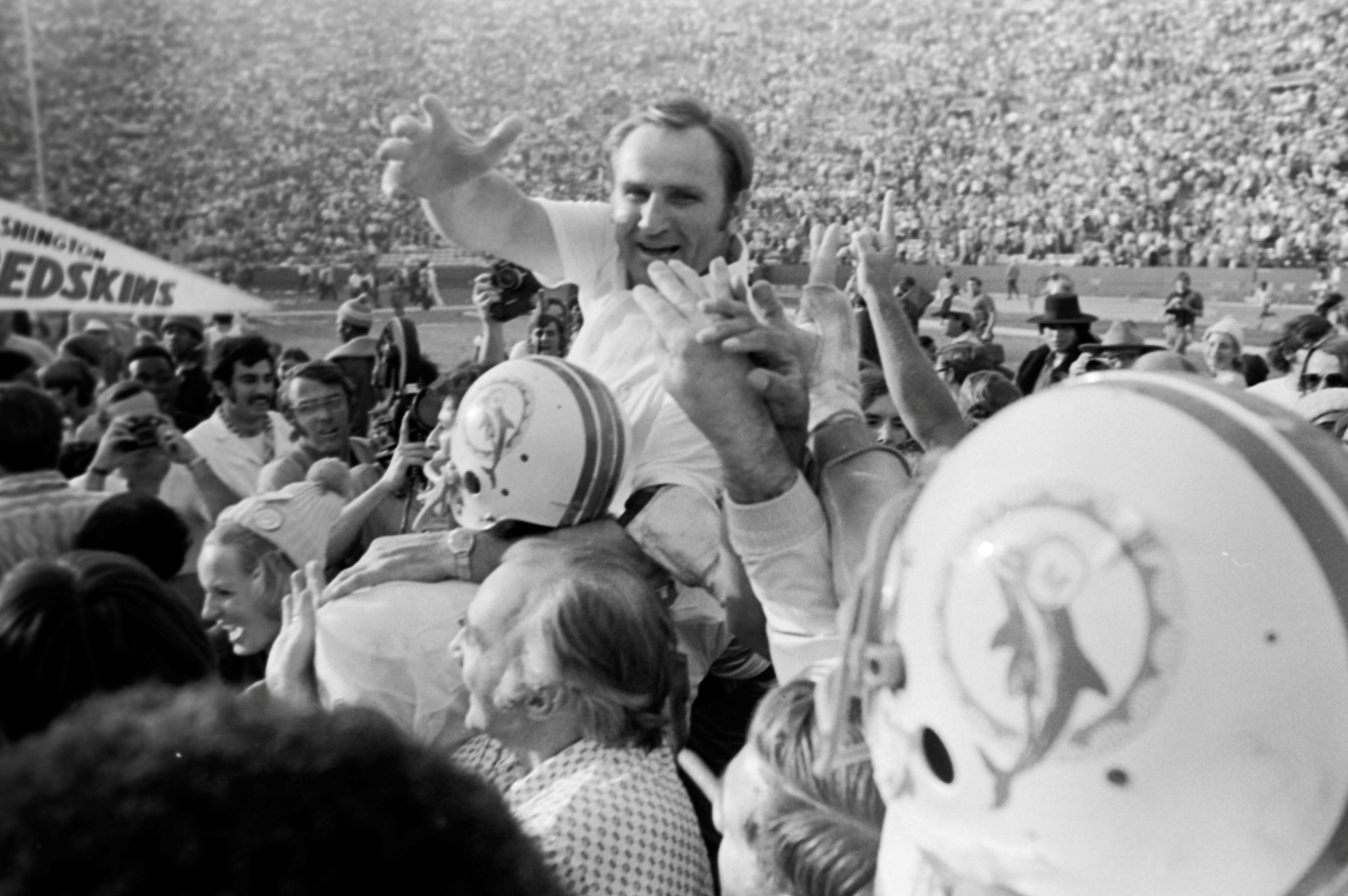
Everyone knew who the best coach was.
(Photo courtesy of the Miami Dolphins)
With the AFC Championship on the line, Larry Seiple defied the winningest coach in NFL history.
The punter for the 1972 Dolphins didn’t receive the signal to run a fake from his coach. He simply saw the hole the Pittsburgh Steelers left open…a hole his grandmother could have run through, he told reporters. Reacting in the moment, Seiple held the ball and ran 37 yards.
Seconds later, a touchdown pass from Earl Morrall to Larry Csonka tied the game. That touchdown turned out to be the difference. The Dolphins won by four points.
There might have been a very good reason Seiple’s coach didn’t signal for a fake. Seiple might not have seen a charging defender. He might have tripped on the play. A Steelers defender might have stripped the ball.
Had it not worked, Seiple is fond of saying, he probably would have walked home from Pittsburgh…because Don Shula wouldn’t have let him on the plane.
But because it worked, because Seiple followed his instinct, the Dolphins became AFC Champions. Because a special teams player thought independently in the heat of the moment, the Dolphins went to the Super Bowl to complete an undefeated season.
Because Larry Seiple stepped up in a clutch moment, the Miami Dolphins of 1972-73 have stood alone to this day as the only team in NFL history to have won every single game of a season.
One clutch play.
As Csonka says, that’s how finite it gets.
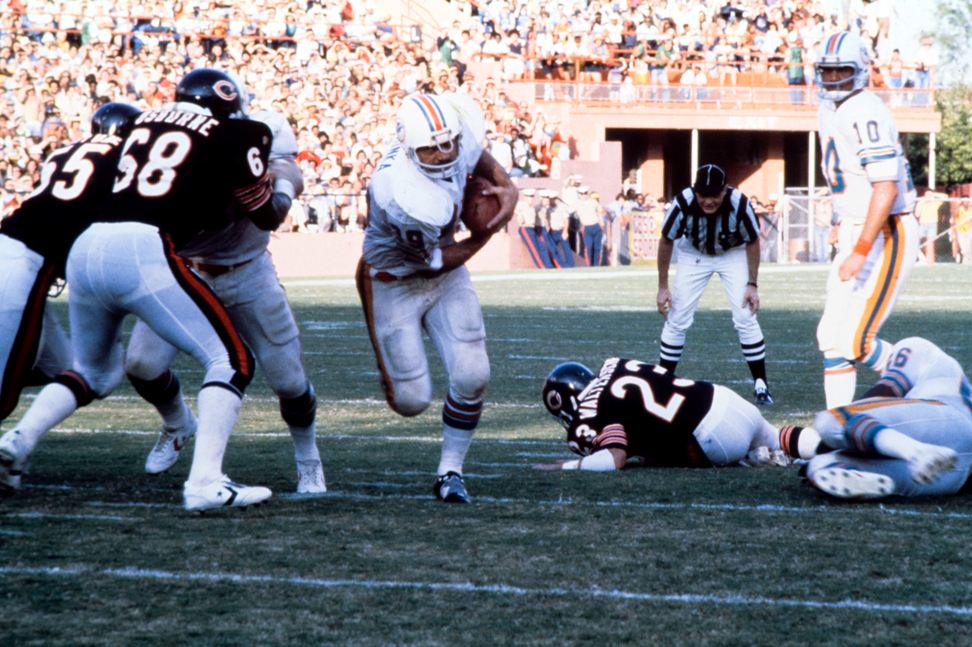
The Dolphins were always happy to give Zonk the ball.
(photo courtesy of the Miami Dolphins)
The point of highlighting Seiple’s moment of defiant intuition isn’t to suggest that a Perfect Season is a result of luck or even Divine Intervention…although a case could be made for a benevolent God smiling on a devout coach who attended Mass on a daily basis.
The point is to underscore the reality that to go an entire season undefeated, a team needs contributions from everyone, and a coach that relentlessly drills the importance of commitment and unity into them.
The 1972 Miami Dolphins weren’t lucky. They were a very, very good team…as any member of the team will be happy to tell you.
“Some people made a small contribution because he only got on the field at a certain time on one play,” Csonka remembers, “and other people made a larger contribution, but the fact of the matter is without all the contributions, you don’t have the Perfect Season.”
David Shula, son of the legendary coach, spent a great deal of time working in the team’s summer training camps as a young lad. He remembers what made their bond special.
“So many great people, not just great football players. You talk about guys like Bob Griese, and Nick Buoniconti, Larry Little, Larry Csonka, you know, Paul Warfield, Howard Twilley, Jake Scott, just tremendous human beings and great members of the community.
“They truly enjoyed being around each other,” he continues. “They wanted to win for each other more than they wanted to win for themselves, and really cared about each other and played for each other as a result.”
Manny Fernandez, one of the many stars of the absurdly nicknamed “No Name Defense”, also doesn’t see the Perfect Season as being luck or destiny.
“It was more everybody, every play, trying to do what they could. Those big plays that turned close games into victories, it was a different player every week coming through, whether it was a Dick Anderson interception or a Charlie Babb blocked punt or me stealing a handoff.
“And then, of course, we did have those games where we just beat them handily.”
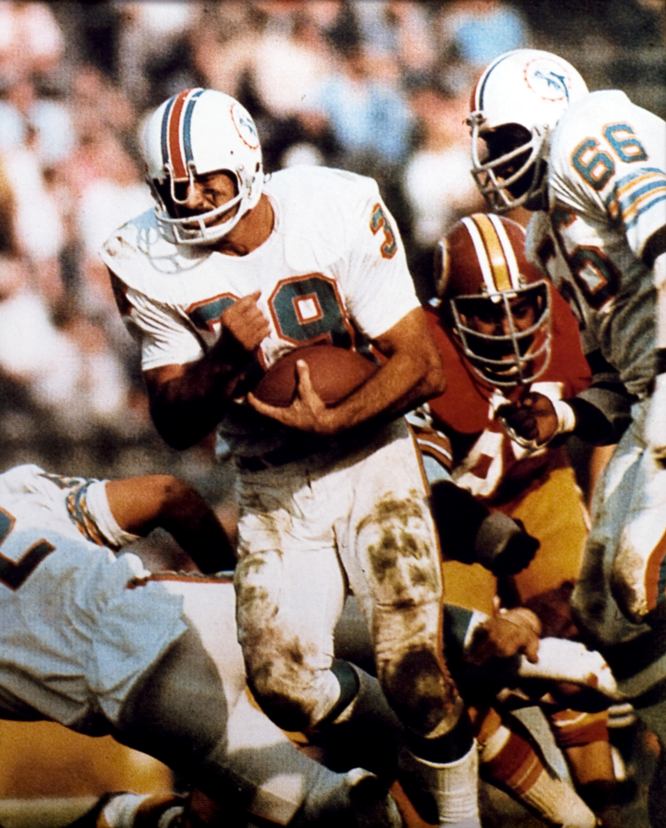
Running with one purpose…revenge.
(photo courtesy of the Miami Dolphins)
There was one key motivation that every Dolphin shared going into the 1972 season…a humiliating 24-3 loss to the Cowboys in the Super Bowl the year before.
Fernandez remembers it all too well.
“Losing the Super Bowl,” he still reflects with a sigh, “is the worst feeling in the world. You work so hard to get there. It’s hard to explain the disappointment.
“I bought 100 tickets for that game for family and friends. A lot of them were at the hotel we were staying at, waiting for us to come back. I had to take a break in the parking lot, just literally sat on the bumper of a car and let the emotions run. I was in tears, I had to compose myself before I could go in and face everybody. I just felt like I’d let my whole family and all my friends down, not to mention the fans in Miami.
“I think to a man we vowed, we weren’t gonna feel that way again next year. No matter how hard Shula pushed us or how hard he worked us, we knew why, we knew where we needed to be, and what we needed to do to get back and redeem ourselves.
“That whole season was redemption.”
Csonka remembers that Coach Shula was emphatic that every game in 1972 was going to be treated like the Super Bowl.
“Had he anticipated that we were going undefeated? No, I don’t think he had any design on that. Just how serious we were going to approach every game, so that by the time we got to the Super Bowl, if in fact we did, we would be ready and know how to prepare. And that part was a prediction and that part did come true.”
The coach, Zonk and Manny both remember, used every edge on the field…including Miami weather.
“He decided that we would practice twice to sometimes four times a day in 90 degree heat,” Csonka recalls, “and we would become camel-like so that we were acclimated to that tropical situation. Any kind of little idiosyncrasies like that, he used those as added gunfire in the battle.”
Fernandez wasn’t always a fan of playing in the intense Miami heat, though.
“You get on that poly turf, and the temperature of the surface would be 120 degrees, and the air you’re breathing is 110. There’s no doubt it gave us an edge, but it also cut into us a little bit as well. There were more times than one I was getting intravenous fluids at halftime to keep from collapsing. It wasn’t always fun with that hot weather.”
Coach Shula demanded a lot, Fernandez says, but “the guys on the team, we respected him and what he was doing, and what it was doing for us.”
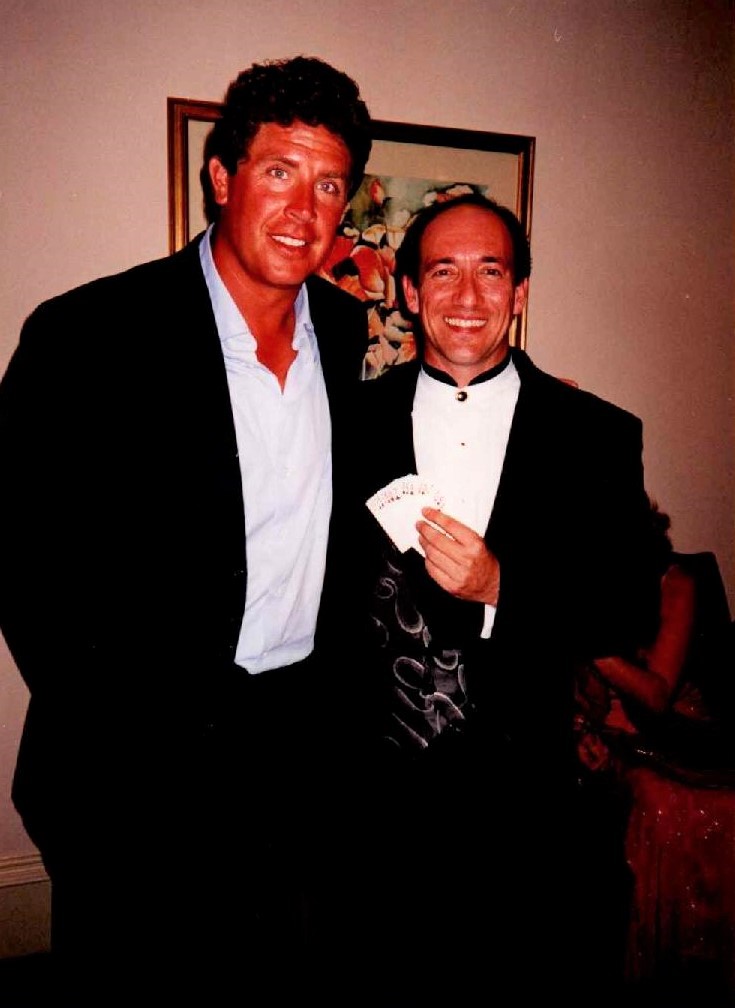
Dan Marino worked his magic to ensure the Dolphins stand alone.
(photo courtesy of Mio Rodriguez)
Perfection, by definition, is impossible to attain for humans. To claim that any achievement is perfect, we have to redefine the meaning of it.
The Miami Dolphins of the 1972-73 season didn’t shut out all of their opponents. Larry Csonka and Mercury Morris didn’t make it to the end zone every time they carried the football. Bob Griese and Earl Morrall didn’t complete every pass they threw. Garo Yepremian’s inexplicable Super Bowl gaffe nearly negated the unprecedented achievements of an entire season.
But within the parameters of a Perfect Season, the Miami Dolphins have set the standard. Seventeen football games, every single one of them ending with a Dolphins victory. The team was as perfect as it needed to be to be called the greatest team in NFL history. Half a century later, no team has been able to meet even that scaled down definition of Perfect.
Two teams have come very close…the 1985 Bears and the 2007 Patriots.
Dan Marino and the Dolphins did their part in turning the 1985 Bears’ campaign into an Almost Perfect Season. Dave Shula was coaching under his father that Monday night at the Orange Bowl. He remembers how electric the atmosphere was, and the strategy they devised to beat a seemingly unbeatable team.
“We had a revolutionary plan that nobody else had tried, and we said, what the hell? Nothing else has worked. Because they were just overpowering people.
“The simple plan was just to put him in the game, Nat Moore, instead of a tight end on first down, and throw the ball. They didn’t substitute and they tried to cover him with Wilbur Marshall, who couldn’t cover Nat Moore. And we put up a big number on them by halftime.
“That was one of the all-time great teams,” Shula remembers with pride, “but they will never be able to say they had the perfect team.”
Of the 2007 Patriots’ campaign that ended with the season’s only loss, Larry Csonka says that he is still the “biggest fan” of Giants head coach Tom Coughlin and quarterback Eli Manning. Even as the unbeaten Patriots were 12-point favorites over the 10-6 Giants in Super Bowl XLII, Mercury Morris could still be seen on TV reminding everyone that “to be undefeated, you got to win every game!”
Manny Fernandez knows better than anyone how the Patriots’ season revived the memories of the Dolphins’ perfect campaign.
“I was actually watching the game with the reporter from the Palm Beach Post. He had come to the house with a cameraman and a sound person, and he was talking to me all through the game and literally putting it on air. Then when the game was over, the local channel that did the Don Shula Show, they sent a crew over to the house at 11 o’clock at night to interview me!”
Dave Shula remembers that his 78-year-old, ultra-competitive to the end father was at the game, and “I remember him saying that he jumped up, and had the smallest measurable vertical jump in the history of vertical jumps.”
Dave worked at Shula’s restaurants for 22 years, and following the improbable Giants victory, “we sent Eli Manning a bunch of gift certificates for he and his offensive linemen to share with their teammates to Shula’s.”
“We’re proud of being the only undefeated team in history,” Fernandez reflects.
“We worked hard to do it.”
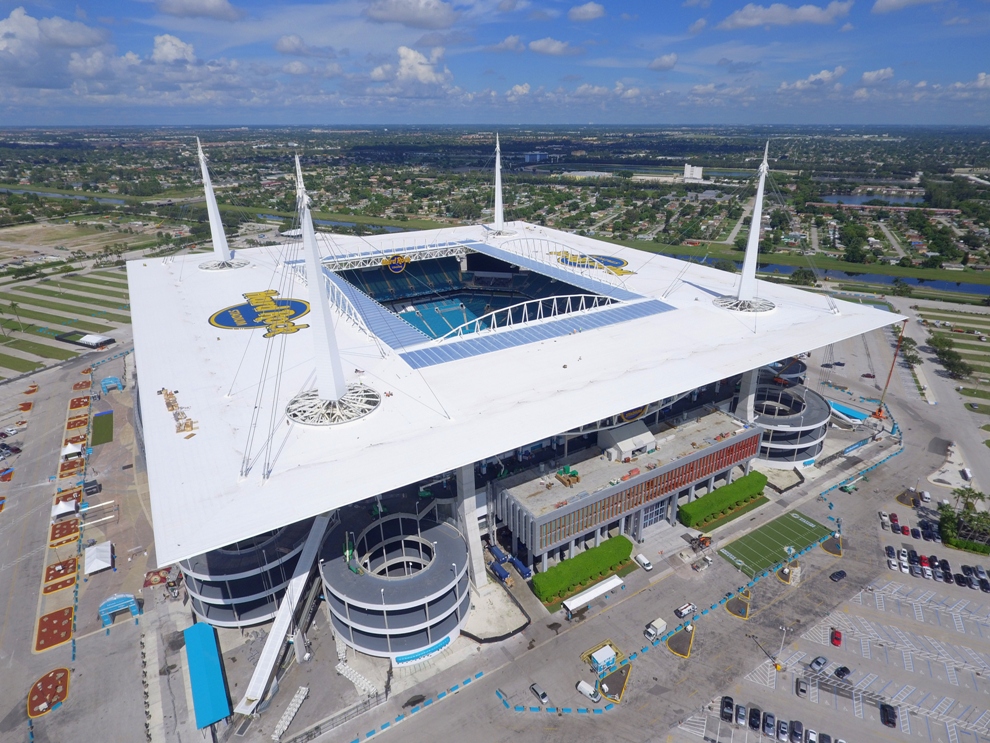
Because 50 years ago, a group of guys made Miami a football city.
(photo courtesy of the Miami Dolphins)
It’s impossible to measure what the success of a sports team does for a city, but the 1972 Dolphins gave the Miami community a new point of pride…and it still does today.
Dave Shula remembers his family leaving for Miami from Baltimore when his father was hired away from the Colts. “My classmates had put little paper signs and they hung them in the windows all the way across the classroom that said, basically, ‘Dolphins suck.’”
But the winning coach was most welcome in an area where the only major sports team in the city had only won three games the season before.
“Miami even then being such a melting pot,” his son remembers, “there was nothing that really pulled the people together from the sports scene until the Dolphins in ’70. They started to win, and then continued that in ’71 going to the Super Bowl, and then of course the undefeated season. It really galvanized the community. I remember going to those games as a little guy, how exciting it was going to the Orange Bowl. They were constantly sold out and the fans were just terrific.
“I like to joke that I had a lot of new best friends on Monday morning. I remember a picture that was in the Miami Herald after they won the Super Bowl. There was a whole bunch of people from my school in the background. I think I only recognized one of them, and they were all hugging me like I was their brother. It was funny.”
Csonka remembers a diverse number of age groups in Miami as well as nationalities, who suddenly had a common bond.
“The older ones were enthusiastic fans,” he recalls, “whether they moved down from Buffalo or New England or wherever they moved down from to retire. The young ones, of course, are fired up to be first time champions.
“Those two sections of fans came together as a very, very enthusiastic crowd. If you go back and look in the early 70s when Shula first came, sales and season tickets went up terrifically, and we had sold out situations in the early part of the season in 1970.”
Is Miami represented in all four major sports today without the early 1970s Dolphins proving that the city will very enthusiastically support a winning team?
That’s impossible to answer, but the Rays’ attendance numbers don’t exactly make a strong case to add an NBA team in Tampa Bay. And they were in the World Series not long ago.
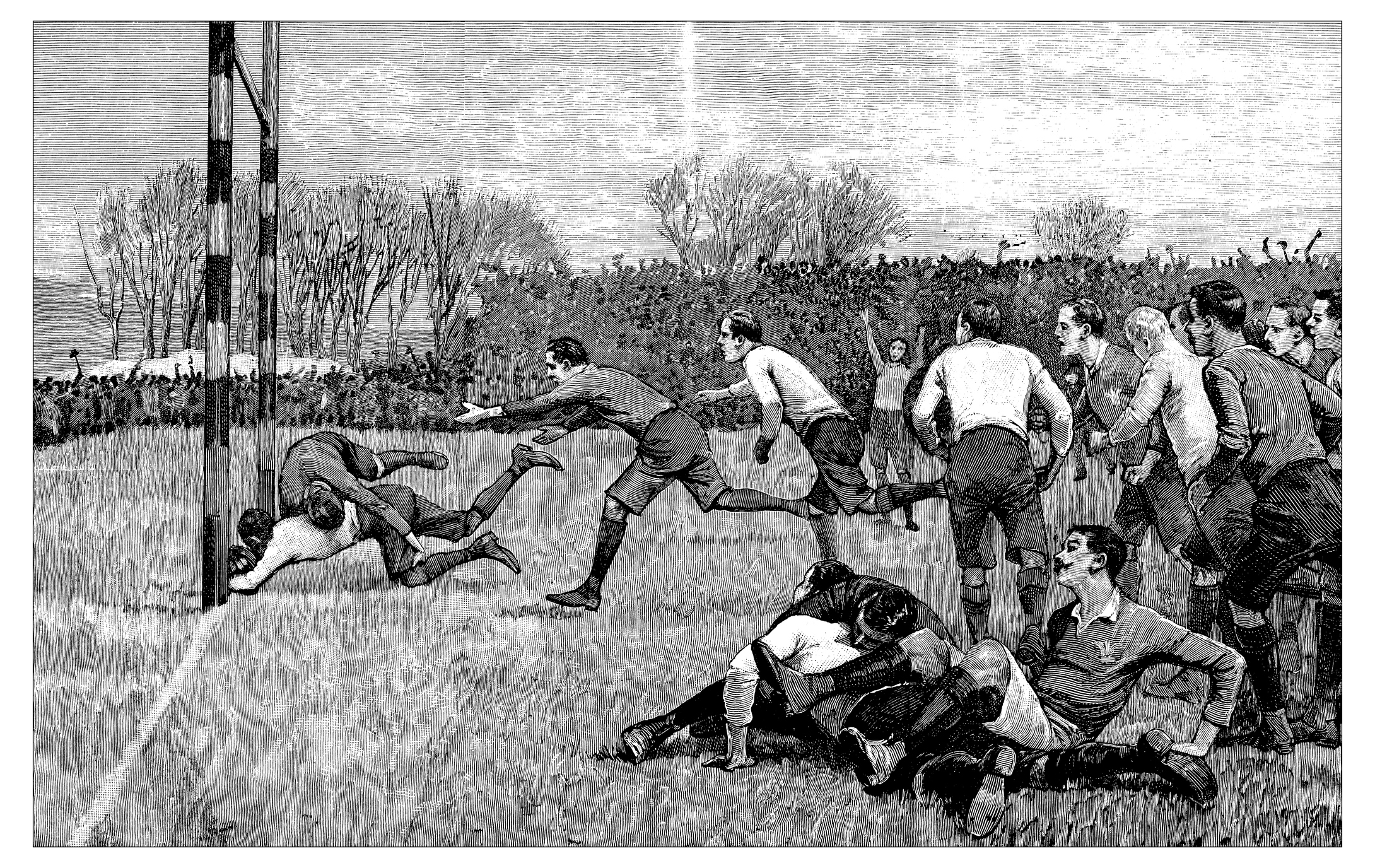
Never in American professional football history.
Manny Fernandez reminded this scribe that it isn’t just the 50 years since that hasn’t produced an unbeaten and untied team. It hasn’t been done by any other team in the 103-year history of the NFL, even when seasons were only eight games long.
Yes, the Dolphins caught some breaks and won games that turned on a single play. And Dan Marino and Eli Manning both played a vital role in keeping the most astounding team achievement in NFL history unmatched in 50 years and counting. Every team that climbs the highest of mountains benefits from some luck.
But in the grand scheme of things, what made the Perfect Season possible was a team full of outstanding players, a brilliant and uncompromising coach, and a truly unified dedication to victory on the part of everyone involved…right down to a punter who was willing to go against his coach and be willing to walk 1,181 miles if it went bad.
A Perfect Season doesn’t turn on one big play. It’s the sum of all of its parts, every player, every play.
As the Miami Dolphins of 1972-73 all know, it’s better to be good than lucky.
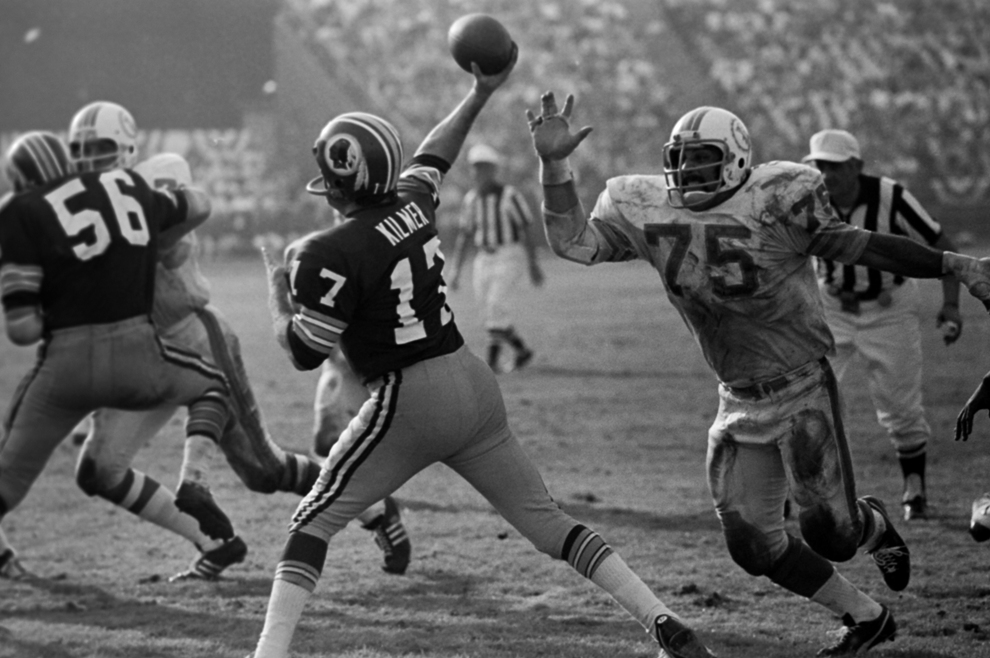
It was never long before Manny was on you.
(photo courtesy of the Miami Dolphins)
Manny Being Manny
Cowboys coach Tom Landry is often credited with the “No Name Defense” appellation given to the 1972 Dolphins defense…a squad that featured Nick Buoniconti, Manny Fernandez, Bill Stanfill, Jake Scott and several others. They led the NFL in fewest points allowed in 1972, and also held Billy Kilmer and the Redskins offense scoreless in the Super Bowl. (Washington’s only touchdown came on a special teams play, famously known as “Garo’s Gaffe”.)
In that game, Manny Fernandez made quite the name for himself, with 11 tackles, six assists and a sack…but the Super Bowl MVP award would go to Jake Scott. Csonka and Buoniconti took issue with the award, believing Scott and Fernandez should have both gotten game balls.
But when asked about the snub, Fernandez says with a chuckle, “We won, didn’t we?”
“I was there to win the game, not get a trophy.”
It turns out he didn’t remember a lot about the end of the game, even at the time. He doesn’t tell the story often, but Manny sustained a head injury late in the game.
“I received a concussion right about either the end of the third quarter or the beginning of the fourth quarter. It was a swing pass to Larry Brown. I made the tackle, got him by the jersey, swung him around, and as we swung down to the ground, Nick came in to finish him off and got me right in the temple.
“I played out the game, but I don’t remember any of it. I don’t remember that night, the celebration. Woke up in the morning, I had to ask my wife if we won.”
It’s easy to call Fernandez a big game player…his Super Bowl totals include three sacks and 28 tackles in three appearances on football’s biggest stage. But as Dolphins fans knew, those types of performances were just Manny being Manny.
Fernandez recorded 35 sacks in his eight year career, with 4 1/2 sacks in the postseason. He was a second team All-Pro twice, a second team All-AFC selection twice, and an All-AFC selection once. The Dolphins wouldn’t likely have won back to back Super Bowls without Manny Fernandez pummeling offensive linemen…and his desire made him a perfect fit for Don Shula’s design of a championship team.
“I came into Miami as an undrafted free agent, more or less an afterthought. The entire first week, I did not practice one play. Did all the warmups, did all the work on the machines, the tackling dummies, did all the dummy stuff. I never got on the field until Friday morning.
“Jim Urbanek, number one draft pick, defensive tackle, blew his knee. They put in another number five draft pick from Alabama, and he blew his knee. Coach (Les) Bingaman, our defensive line coach, came over and said, any of you think you can play this game?
“I just looked at him, I said, you’re g**damn right if you give me a chance. He said, okay, Mexican, see what you can do. I went into that scrimmage, bound and determined that I was going to make a name for myself. I was going to make that football team. And I did.
“I started every game from then on.”
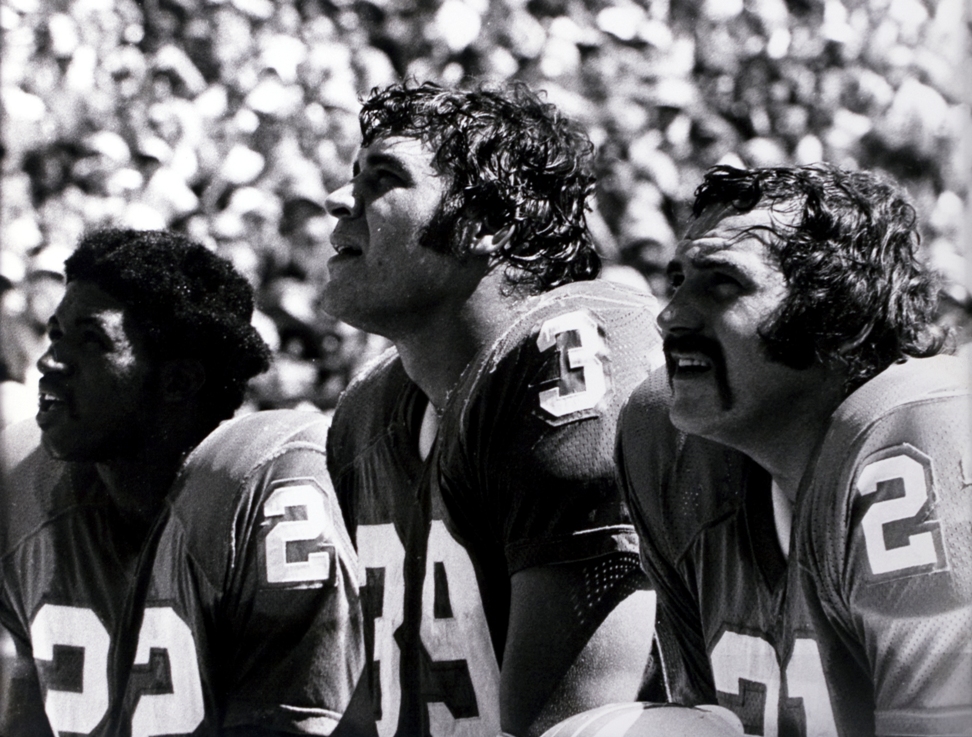
Three true team players.
(photo courtesy of the Miami Dolphins)
The Interchangeable Backfield
There are many stories of members of this team being willing to sacrifice their own personal achievements for the team, but the best example is easily Jim Kiick and Mercury Morris, who split running back duties throughout the season…Kiick as more of a blocking back for Csonka, and Morris as more of a runner who could get to the outside fast.
The younger Shula cites his father’s handling of the Kiick and Morris situation as an example of how the coach set the tone of playing for the team first.
“The story goes that either Jim or Mercury would be in my Dad’s office on Monday, and it was the one that didn’t get to play much the day before. He knew that they needed to vent their frustration because of their competitiveness.
Dave Shula speaks not just as Don Shula’s son, but as a former NFL coach himself. “It’s hard to do that, to keep your star players that aren’t getting the ball as much as they think they should, to keep them content and keep them working toward the goal of helping the team win.”
Csonka remembers the camaraderie between Kiick and Morris, even as the few shared the spotlight in the Miami backfield.
“You’d see Jim run off the field, Merc would be running on, and they’d smack hands as they passed each other. Jim only ever bitched one time. We were close to our own end zone, and it was a 40-yard sprint with the bench, and he didn’t like that part. He didn’t want to run 40 yards to the bench and 40 yards back!”
Csonka remembers the moment with a laugh, but as a Hall of Famer who played for winning and losing teams in his career, he knows how it could have turned out had Kiick or Morris not been on board.
“If you don’t have that,” Zonk says of the two players’ mutual respect, “if you have animosity that builds, it’s like a cancer on the team. It’ll start between two players, and it’ll carve up the team before it’s over.
“But Shula made such a strong case of everyone being disciplined to the fact that winning became more important than personalities or number of carries or any of those other things.”
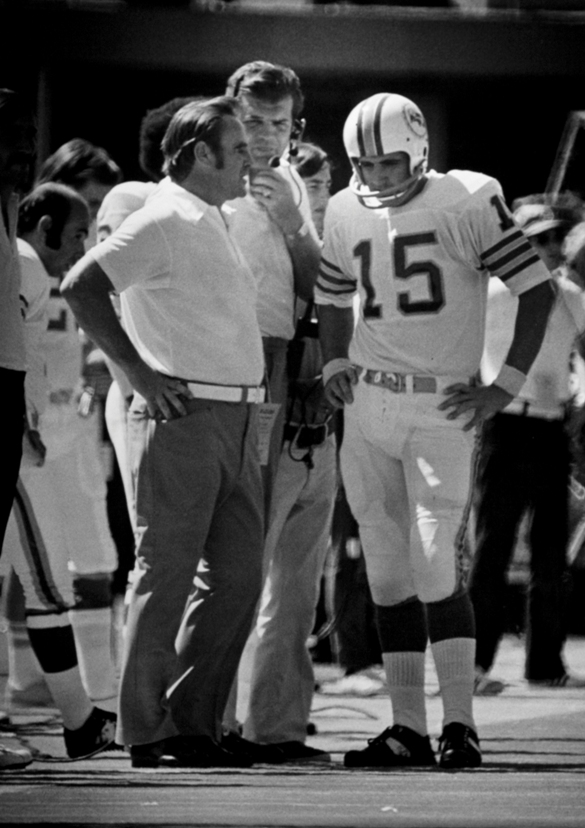
“Get ready to shed your placeholder status, Earl.”
(photo courtesy of the Miami Dolphins)
“Weak Schedule” vs. “Backup Quarterback”
It’s been noted by sportswriters and non-Dolphins fans that the 1972 Dolphins benefited from a weak schedule, and the claim isn’t entirely without merit…only two of the teams the Dolphins defeated during the season had winning records.
But if someone brings that argument up with you, remind them that the Dolphins also lost their Hall of Fame quarterback in the fifth game of the season, and proceeded to win nine games and a playoff game with a backup quarterback. It’s doubtful the 2007 Patriots could have pulled that one off.
Backup QB Earl Morrall is one of the 1972 Dolphins’ biggest heroes. Following Bob Griese’s ankle injury, Morrall took over and kept the train rolling. He threw for 1,360 yards and 11 touchdowns in nine games, and then led the team to a victory in the Divisional Round playoff game against the Browns.
But most importantly, after bringing the Dolphins to the dance, in the AFC Championship game Morrall went back to the bench and let Griese finish the job without complaining. Like everyone else on the team, he had made his vital contribution to the Perfect Season.
In his book, The Winning Edge, Don Shula tells the story of convincing Dolphins owner Joe Robbie to pick up Morrall to back up Griese. Morrall had been the backup for Johnny Unitas and had performed a similar feat in Baltimore, leading the Colts…coached by Shula…to a Super Bowl as a backup before their infamous loss to the Jets in Super Bowl III.
The Dolphins, being the AFC champions at the time, had the second to last chance to claim Morrall when the Colts placed him on waivers, but the rest of the NFL passed on a backup QB who would make history starting and winning nine games of a Perfect Season.
Shula recalled the moment when he decided to switch back to Griese to start the second half of the AFC Championship game against the Steelers.
“What I had to tell him was hard. He had done the job all season long and I was appreciative beyond words. But I had to do what was best for the team.”
In the brief conversation they had, Morrall immediately accepted the decision and informed Shula, “If you need me I’ll be ready.”
If anyone exemplifies what it takes for a team to achieve a Perfect Season, it’s Earl Morrall. Who was Tom Brady’s backup in 2007 again?

